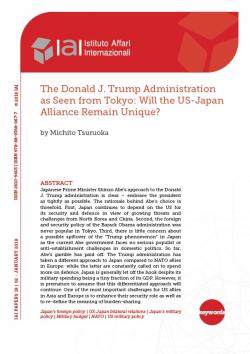The Donald J. Trump Administration as Seen from Tokyo: Will the US-Japan Alliance Remain Unique?
Japanese Prime Minister Shinzo Abe’s approach to the Donald J. Trump administration is clear – embrace the president as tightly as possible. The rationale behind Abe’s choice is threefold. First, Japan continues to depend on the US for its security and defence in view of growing threats and challenges from North Korea and China. Second, the foreign and security policy of the Barack Obama administration was never popular in Tokyo. Third, there is little concern about a possible spillover of the “Trump phenomenon” in Japan as the current Abe government faces no serious populist or anti-establishment challenges in domestic politics. So far, Abe’s gamble has paid off. The Trump administration has taken a different approach to Japan compared to NATO allies in Europe: while the latter are constantly called on to spend more on defence, Japan is generally let off the hook despite its military spending being a tiny fraction of its GDP. However, it is premature to assume that this differentiated approach will continue. One of the most important challenges for US allies in Asia and Europe is to enhance their security role as well as to re-define the meaning of burden-sharing.
Paper prepared for the Istituto Affari Internazionali (IAI), January 2018. An earlier and shorter version of this paper was presented at the Sasakawa Peace Foundation (SPF)-sponsored workshop, “World views on the United States”, Yokohama, 27 March 2017.
-
Details
Roma, IAI, January 2018, 15 p. -
In:
-
Issue
18|02 -
ISBN/ISSN/DOI:
978-88-9368-067-7
1. Conditions and beliefs behind Abe’s approach to Trump
2. NATO and the US–Japan alliance: different tales
3. Burden sharing à la Trump
Conclusions
References



